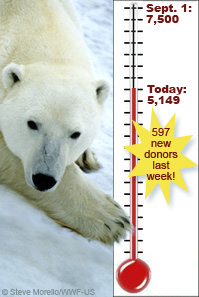Take Action for the Center for Biological Diversity
Tuesday
Take Action for the Center for Biological Diversity
Monday
Pseudibis papillosa sighting
I saw a family of Red-naped Ibis cranes in Rajapalayam during my last visit there. I was certain that these birds had taken refuge in this small town by way of a respite from their hundreds of thousands of miles of migration between strange lands.It came as a surprise that these birds are indeed common to South India. Never seen one before. Took some time to track down the species – visual search on the internet is still not there yet. Finally stumbled upon a useful site in the form of birding.in.
The cranes were mostly perched on the tallest of branches and were best in view when they were atop one of the many coconut trees. With a simple point and shoot camera, I was only able to get the frustrating pixelated blurry zoom shots. On the day I left the place, however, I was on the terrace and noticed one on a tree and this is the best shot I could get during the entire trip. I’ve added a better picture of the crane from birding.in. 
The pseudibis papillosa has a very unique howl like call. Certainly not a song bird!
BirdLife International (2008) Species factsheet: Pseudibis papillosa. Downloaded from http://www.birdlife.org on 9/3/2009
Sunday
More sewage in S.F. Bay? This has to stop.
|
Powered by Qumana
Tuesday
WWF message to save polar bears

Polar bears are at risk of extinction due to melting and thinning arctic ice, and could disappear by the end of this century if we don't take action.
Because you care so much about the diversity of life, we wanted you to see this critically important ad, too! Actor and WWF supporter Noah Wyle generously donated his time to record this important message about polar bears at risk. Watch this two-minute video right now.
Now that you've seen this powerful message, please take action to help save polar bears and other endangered wildlife and wild places. Start by visiting WWF's new website created specifically to support this campaign. Here you can learn more about polar bears and other threatened species and their habitats and the many ways WWF is working to protect them.
You can also forward this message to a friend, to help increase awareness about the risk of extinction polar bears and other endangered animals and places are facing.
There's one more way you can help, and that's by joining WWF's Wildlife Rescue Team today. Wildlife Rescue Team members pledge a monthly gift to help fund WWF's most urgent conservation projects. As a member, you'll help provide the stable funding that is so critical to protecting polar bears, orangutans, elephants and many other majestic species.
We're already 5,149 members strong, but - in order to make the biggest difference - we need 7,500 committed supporters by September 1. Just last week, 597 people committed to helping WWF. Won't you help us reach our goal?

Free t-shirt and polar bear
photo when you join the
Wildlife Rescue Team today!
At WWF we're leading the fight to save the polar bear, but funding is critical - and there isn't much time. Your support of $16 or more per month will help us address the urgent issues of climate change and habitat preservation for the polar bear and many other animals. Make the commitment to saving wildlife today.
You'll also get a FREE t-shirt with your first monthly gift of $16!
It isn't enough to care about the diversity and abundance of life on Earth. We must take action to save animals and natural areas, and your help is needed now. Thank you.
Sincerely,

Terry Macko
Vice President, Membership
P.S. One very effective way to help save wildlife is by becoming a member of WWF's Wildlife Rescue Team today. Get a FREE t-shirt when you join today! You can also learn more about the many ways WWF is working to save the polar bear and other animals, when you visit the new website created exclusively to support this urgent campaign. Thank you.
Monday
Letter to Ciera (from WWF)
Letter To Ciera
You’ll never watch an elephant standing on her head
You will see amazing acrobats and painted clowns instead.
You’ll never color Easter eggs or eat a “Happy” Meal
Instead you’ll give pigs belly rubs - You’ll know chickens dream and feel.
The clamor from the ice cream truck won’t be music to your ears
You will know your Soy Delicious caused no suffering or tears.
You may hear a gentle gobble as you softly stroke a turkey
And give thanks that she’s alive as you’re eating your Tofurky.
While other kids buy leather shoes and eat at Chucky Cheese
You’ll be kissing cows and feeding goats and saying “soy please!”
Being different can be hard I know - This world is often cruel
Maybe you’ll be laughed at by the other kids at school.
But compassion is a vital gift that too few share with others
And your heart will not be filled with guilt the way it plagues your mother’s.
So don’t ever be embarrassed or ashamed because you care
You’ll be uniquely beautiful with an empathy that’s rare.
And when you see a rescued lamb and touch his thick warm fleece
You’ll feel no sadness or remorse - You can look at him in peace.
What took so long for me to learn, I’ll start teaching you from birth
And your footprint will be much tinier on this fragile earth.
~Heather Leughmyer
Thursday
Center for Biological Diversity - Press Release - Rapid Action Plan to Save the Polar Bear Unveiled at Congressional Hearing
Center for Biological Diversity - Press Release - Rapid Action Plan to Save the Polar Bear Unveiled at Congressional Hearing
The Center for Biological Diversity today released a “Rapid Action Plan” to address global warming that has already resulted in a drastic reduction in Arctic sea ice and threatens to drive polar bears extinct. The plan calls for strong reductions in methane and black carbon emissions, pollutants with disproportionate impacts on the Arctic, as immediate measures to slow global-warming impacts alongside global reductions in CO2 emissions.
Friday
The Tiger
Could frame thy fearful symmetry?
In what distant deeps or skies
What the hand dare seize the fire?
And what shoulder and what art
Could twist the sinews of thy heart?
And when thy heart began to beat,
What dread hand and what dread feet?
What the hammer? what the chain?
In what furnace was thy brain?
What the anvil? What dread grasp
Dare its deadly terrors clasp?
When the stars threw down their spears,
And water'd heaven with their tears,
Did He who made the lamb make thee?
Dare frame thy fearful symmetry?
William Blake's immortal lines...
Good news for fans of the Tiger, a sub species, the South China Tiger, thought to have been extinct was sighted.
Rare China tiger seen in the wild
Tiger, Tiger, daring to defy...
Sunday
Stop Blue Whales From Being Killed by Ships
 Last month, three endangered blue whales were killed when they were hit by large ships in their feeding grounds off the southern California coast. The coastal waters of southern California are home not just to the largest animal that has ever lived on Earth, but also to the busiest shipping lanes in the United States. Unusual ocean conditions this year have led to large numbers of blue whales feeding in the rich waters off southern California for much longer than normal, putting them directly in the path of fast-moving cargo ships and oil tankers. Ship strikes are one of the leading causes of death of large whales worldwide, and scientists have identified ship speed limits as the most effective method to reduce whale mortality.
Last month, three endangered blue whales were killed when they were hit by large ships in their feeding grounds off the southern California coast. The coastal waters of southern California are home not just to the largest animal that has ever lived on Earth, but also to the busiest shipping lanes in the United States. Unusual ocean conditions this year have led to large numbers of blue whales feeding in the rich waters off southern California for much longer than normal, putting them directly in the path of fast-moving cargo ships and oil tankers. Ship strikes are one of the leading causes of death of large whales worldwide, and scientists have identified ship speed limits as the most effective method to reduce whale mortality.

Dead blue whale killed by ship
Last week the Center formally asked the federal government to impose a temporary speed limit off southern California to protect the blue whales. While the government has issued advisories for ship captains to watch out for whales, it has yet to impose the speed limits actually necessary to protect these magnificent and highly endangered animals.
Please: Let federal officials know right away how important it is that they impose a binding speed limit for large ships to protect endangered blue whales.
Tuesday
A WIN FOR THE CONDOR: CALIFORNIA SENATE GETS THE LEAD OUT
After three years of legal pressure, the California Senate passed the Ridley-Tree  Preservation Act on September 5, requiring hunters to use non-lead ammunition for hunting big game and coyotes within the California condor range. Passage of the legislation is a victory for the condor as in recent months at least 17 of the endangered birds have suffered from lead poisoning by feeding on carcasses riddled with lead shot. In 2004, the Center for Biological Diversity and allies petitioned California Fish and Game Commission to end the use of lead ammunition statewide; in 2006, the Center filed a suit against the state for continuing to allow such condor-threatening hunting practices.
Preservation Act on September 5, requiring hunters to use non-lead ammunition for hunting big game and coyotes within the California condor range. Passage of the legislation is a victory for the condor as in recent months at least 17 of the endangered birds have suffered from lead poisoning by feeding on carcasses riddled with lead shot. In 2004, the Center for Biological Diversity and allies petitioned California Fish and Game Commission to end the use of lead ammunition statewide; in 2006, the Center filed a suit against the state for continuing to allow such condor-threatening hunting practices.
Source: Center for biological diversity
Monday
Picture Quiz #3
My fascination with 'eyes' continues...
Identify the species this eye belongs to. Clue: The question is intrinsic to the answer. On a different note, my heart goes to the poor Congo gorillas - shot dead for an yet unclear reason.
On a different note, my heart goes to the poor Congo gorillas - shot dead for an yet unclear reason.
| Monkey, my monkey, | |
| Your restlessness-life | |
| Has won a transformation-face. | |
| What a miracle! | |
| Yesterday you belonged | |
| To God's unconditional Grace. | |
| Today you belong | |
| To God's Aspiration-race. (http://www.srichinmoylibrary.com/animal-kingdom/32.html) | |


 This week, there have been at least four major releases of treated and untreated sewage into San Francisco Bay, constituting more than 1 million gallons of effluent. This is in addition to the more than 400,000 gallons of sewage dumped into the Bay last week after a treatment plant in Sausalito sprung a leak.
This week, there have been at least four major releases of treated and untreated sewage into San Francisco Bay, constituting more than 1 million gallons of effluent. This is in addition to the more than 400,000 gallons of sewage dumped into the Bay last week after a treatment plant in Sausalito sprung a leak.





